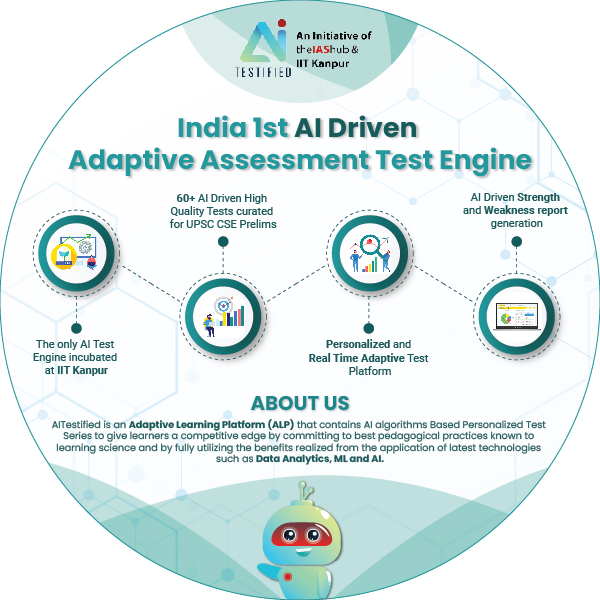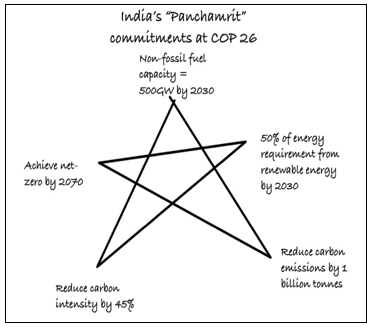Q. ‘Climate Change’ is a global problem. How India will be affected by climate change? Highlight key measures undertaken by the Government in this regard. (Answer in 250 words).
05 Oct, 2022
GS III
Daily Answer Writing 2022-23 ( Upgrade)
Modal Answer
Modal Answer
From shifting weather patterns that threaten food security (in tropical regions), to rising sea levels that increase the risk of catastrophic flooding (in small island nations), the impacts of climate change are global in scope and unprecedented in scale.
Impact of climate change on India
Ecological Impact
- Extreme heat: urban areas rapidly becoming “heat-islands.
- Changing rainfall pattern: fewer rainy days along with more extreme precipitation.
- Droughts: 1/3rd of India's districts have faced more than four droughts over the past decade.
- Sea level rise: Kolkata & Mumbai particularly vulnerable.
- Increased frequency of cyclones: due to warming up of ocean, E.g. Tauktae, Yaas, Nisarga
Economic Impact
- Economic Losses: India loses 0.5% of GDP annually due to Extreme weather events (WMO).
- Loss of productivity: By 2030, India would experience productivity loss equal to 35 million full-time jobs (ILO).
Social Impact
- Deteriorating HDI: rise in extreme poverty, loss of livelihood, health impacts etc
- Rising “Climate Change Refugees”: within India, around 50 lakh internal displacements in 2019, highest in the world.
- Agriculture & food insecurity: 65 million people in danger of starvation as a result of climate change (IFPRI).
- Water Conflicts: Indus & Ganga Basins are already going through tensions between India, Pakistan and Bangladesh.
- Disease/Pest outbreaks: intensity of vector borne diseases like Malaria, Zika, Dengue; crop loss due to locusts attack etc.
Steps taken:
- Reducing emissions: Hydrogen Mission, National Solar Mission, National Biofuels Policy, Green transport (e vehicles, BRT, Metro), PAT scheme, eco-labelling etc.
- Carbon sequestration: CAMPA, REDD +, MGNREGA
- Technological upgradation: Smart farming; NTPC Energy Technologies Research Alliance (NETRA)
- Climate Resilient Infra: PM Awas Yojana, Smart cities etc
- Funding: National Adaptation Fund for Climate Change (NAFCC); US-India Clean Energy Finance Initiative.
- Waste management: Swachch Bharat Mission, Gobar Dhan Scheme, Jal Shakti abhiyan, Waste to Wealth.
- International Collaboration: International Solar Alliance; One sun, one world, CDRI etc.
Outstanding Challenges
- Climate change denial & obstructionist policy of developed countries. Eg. USA è ‘Deadlocked global solution’
- Poor finance & Technology Transfer: to undertake carbon neutral/negative growth path.
- Growth Dilemma: Development vs. Environmental conservation esp. with rampant poverty.
- Poor Centre-State-Local Coordination
- Near absent “Environmental Literacy”: Ignorance among people & poor Environmentally responsible behaviour
Way Forward: TACKLE
Approach towards tackling the climate change requires a transformation from ‘Whole of government’ to ‘Whole of the Globe approach’, nudging nations & citizens to move towards a cleaner, greener and sustainable future.
- Take call for action: Paris Agreement/COP discussion now needs to move from making pledges to their fulfilment.
- Adaptation: in agriculture (Climate Smart), infrastructure (disaster resilient), lifestyle - promoting the principles of 3P – Pro-planet People etc
- Common but differentiated responsibility: at global level, technology & fund transfer from developed to developing nations.
- Knowledge management: India Climate Change Knowledge Portal and capacity development at all levels.
- Larger role of Regional/Local Govts: States, PRIs & ULBs, along with participatory role of people eg. carbon neutral village in Karnataka.
- Enhanced cooperation and collaboration – via international alliances – like CDRI, ISA etc.
Please login to upload your copy.
Uploaded Copies
No copies found.

